EPA to relax federal regulations on coal-fired power plant waste
Add Axios as your preferred source to
see more of our stories on Google.

A coal-fired power plant in Pennsylvania. Photo: Robert Nickelsberg/Getty Images
The Environmental Protection Agency plans to ease regulations on coal-fired power plant waste on Monday, according to the Washington Post.
Why it matters: Coal-fired power plants produce coal ash and water that contain mercury, arsenic and other heavy metals that pose risks to human health and the environment if stored improperly. Some power plants store coal ash in unlined waste ponds, which threatens groundwater and waterways.
Details: Under an Obama-era rule, coal-fired power plants were required to line coal ash ponds that were leaking contaminants into groundwater with clay and compacted soil by April 2019 or the ponds would be forced to close.
- Under the new regulations, companies will have to stop dumping coal ash in unlined storage ponds near waterways by Aug. 31, 2020, and either upgrade these sites or begin to close them. But companies can request an extension ranging from 90 days to three years if they need more time to dispose of the waste.
- Additionally, if a plant can prove it is shutting down a coal boiler, it can request to keep its unlined storage ponds open for up to eight years.
By the numbers: Coal waste is stored in roughly 450 sites across the country, according to the Post. Some states have suffered from coal ash spills that have contaminated waterways and exposed people to toxic metals.
- In Tennessee in December 2008, a dike used by a coal plant to contain coal ash broke, causing more than 1 billion gallons of toxic coal ash sludge to pour into the Emory River, according to National Geographic.
- Some of the workers who cleaned up the spill now live with types of cancers and other diseases linked to heavy metal exposure.
What they're saying: EPA Administrator Andrew Wheeler said in a statement that the Obama-era rules "placed heavy burdens on electricity producers across the country. These proposed revisions support the Trump administration’s commitment to responsible, reasonable regulations."
Go deeper: Toxic ash at risk of spreading as Trump's EPA seeks to dismantle protections
